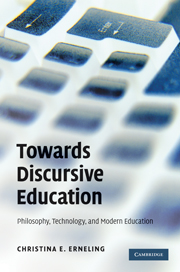Book contents
- Frontmatter
- Contents
- Acknowledgements
- Introduction
- 1 The infantilisation of learning
- 2 Educational technologies and pedagogy
- 3 Piaget and natural learning
- 4 Piaget's conception of the framework: from instincts to intentionality
- 5 The infant as scientist
- 6 The socio-cultural approach to learning
- 7 Towards discursive education
- Appendix
- References
- Index
3 - Piaget and natural learning
Published online by Cambridge University Press: 05 June 2012
- Frontmatter
- Contents
- Acknowledgements
- Introduction
- 1 The infantilisation of learning
- 2 Educational technologies and pedagogy
- 3 Piaget and natural learning
- 4 Piaget's conception of the framework: from instincts to intentionality
- 5 The infant as scientist
- 6 The socio-cultural approach to learning
- 7 Towards discursive education
- Appendix
- References
- Index
Summary
INTRODUCTION
Over the last hundred and fifty years public education has become widespread in the Western world. During this time, educators and psychologists have viewed learning mainly as a matter of transmission of culture from teachers to pupils. This conception of learning was expressed most systematically and forcefully in behaviourism, which both underlay and provided the rationale for the early use of educational technologies, including the early use of computers. More recently the constructivist, internalist approach of natural learning theories has replaced this externalist conception of learning.
As we saw in the Chapter 1, it is common to make a distinction between the acquisition of early, so-called primary, biologically grounded, cognitive skills and later learning of the kind that typically takes place in formal schooling. In spite of this, the dominant view among educators as well as developmental psychologists in the internalist tradition is that all learning is natural learning, that is, like the acquisition of biological, primary cognitive skills. Furthermore, cognitive development is compared to biological development in general. Developmental psychologists have always assumed that the biological basis of human learning and cognitive development is central (see for example Morss, 1990), yet in recent years this biological bias has come even further to the fore. The assumption is that cognitive skills are learned in the sense that their acquisition or development requires both interaction with the environment and biologically prepared structures – universal grammar, schemes, instincts, or theories.
- Type
- Chapter
- Information
- Towards Discursive EducationPhilosophy, Technology, and Modern Education, pp. 67 - 91Publisher: Cambridge University PressPrint publication year: 2010



